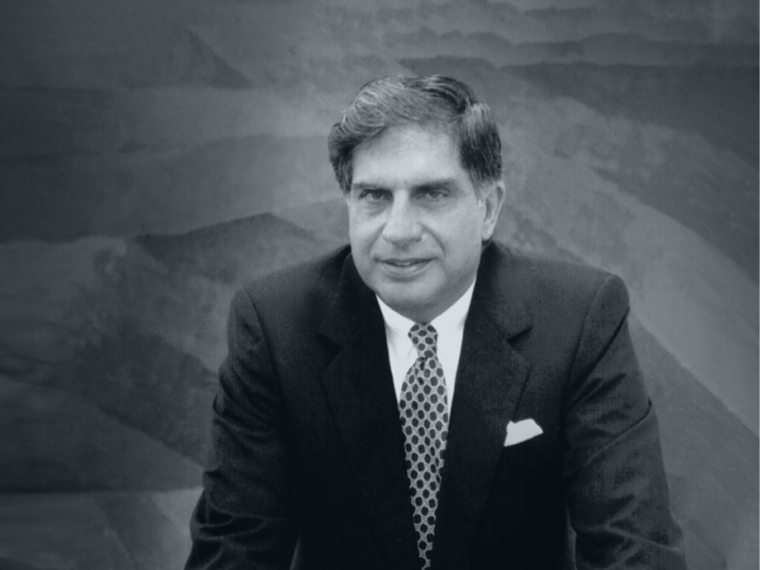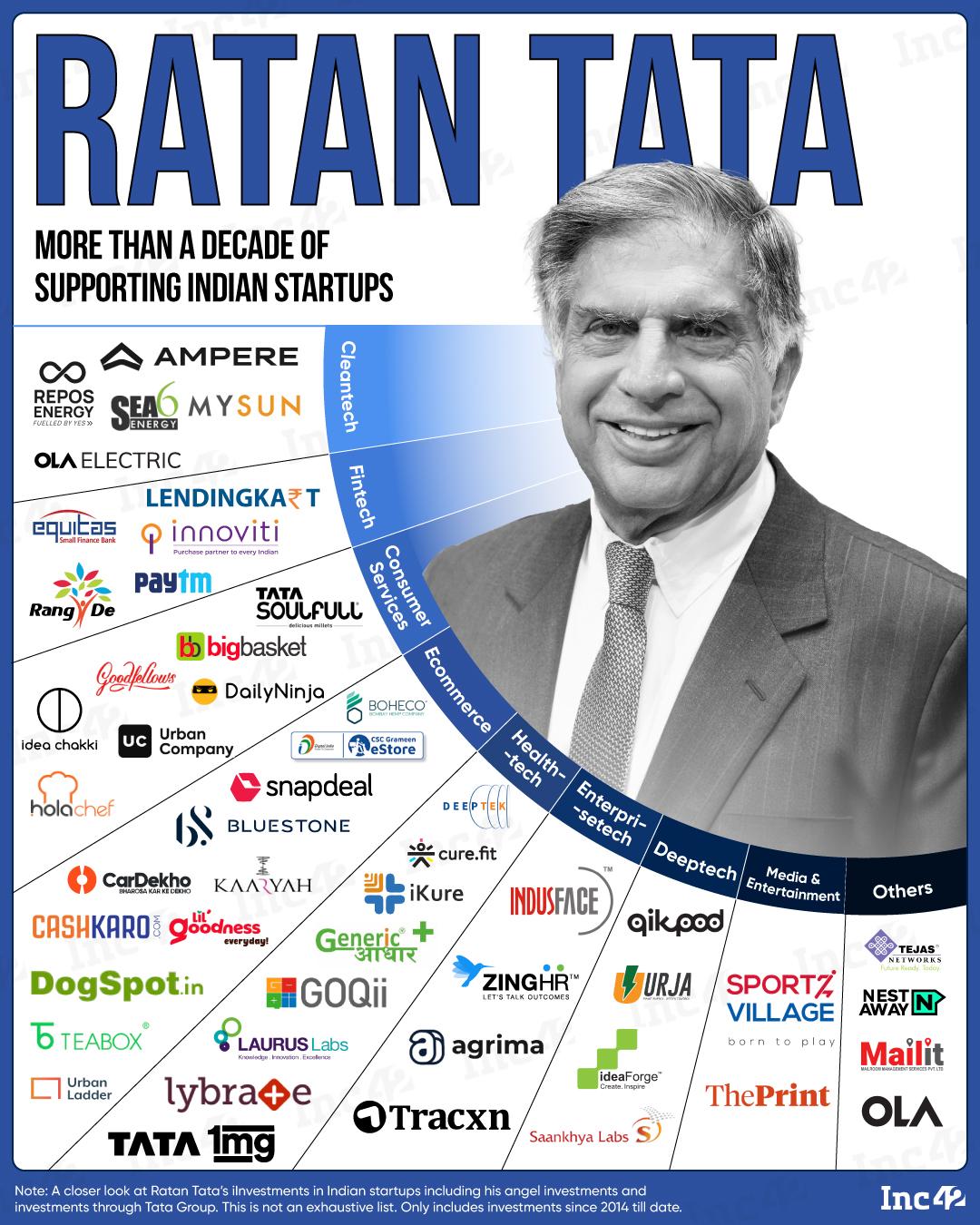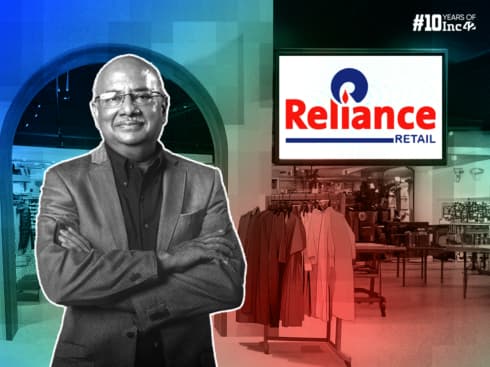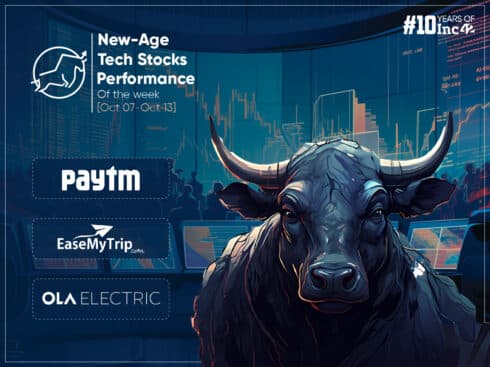
Tata breathed his last at Mumbai’s Breach Candy Hospital, where he was admitted to the ICU following a sudden deterioration of his health
In his decade-long brush with the Indian startup ecosystem, Tata invested in more than 50 startups including the likes of Paytm, Snapdeal and Urban Company
Born in 1937 to Naval and Soonoo Tata, Ratan Tata was brought up by his grandmother, Navajbai R Tata, in a baroque manor called Tata Palace in downtown Bombay
Chairman emeritus of Indian conglomerate Tata Group, Ratan Tata, 86, is no more. He passed away on Wednesday (October 9) while undergoing treatment on account of his age and allied medical conditions.
Tata Sons chairman N Chandrasekaran confirmed his demise in a statement.
“It is with a profound sense of loss that we bid farewell to Mr. Ratan Naval Tata, a truly uncommon leader whose immeasurable contributions have shaped not only the Tata Group but also the very fabric of our nation… On behalf of the entire Tata family, I extend our deepest condolences to his loved ones…,” said Chandrasekaran.
As per news channel India TV, Tata breathed his last at Mumbai’s Breach Candy Hospital, where he was admitted to the intensive care unit (ICU) following a sudden deterioration of his health and a sudden drop in blood pressure.
Condoling his demise, Prime Minister Narendra Modi said, “Extremely pained by his passing away. My thoughts are with his family, friends and admirers in this sad hour. Om Shanti”.
Chairperson of the RPG Group, Harsh Goenka, also tweeted, “The clock has stopped ticking. The Titan passes away. #RatanTata was a beacon of integrity, ethical leadership and philanthropy, who has imprinted an indelible mark on the world of business and beyond. He will forever soar high in our memories. R.I.P”.
“I am unable to accept the absence of Ratan Tata.. With him gone, all we can do is to commit to emulating his example. Because he was a businessman for whom financial wealth and success was most useful when it was put to the service of the global community. Goodbye and Godspeed, Mr. T..,” Mahindra Group chairman Anand Mahindra said.
Synonymous with the Indian industry, Tata, even at the ripe age of 86, enjoyed the popularity that many envied and very few could achieve.
The Early Years
Born on December 28, 1937, to Naval and Soonoo Tata, Ratan was brought up by his grandmother, Navajbai R Tata, in a baroque manor called Tata Palace in downtown Bombay (now Mumbai).
He completed his schooling first at the Campion School and then at Cathedral and John Connon in the then Bombay.
Consequently, he received a bachelor’s degree in Architecture from Cornell University in the US in 1962 and then briefly worked with Jones and Emmons in Los Angeles before returning to India in late 1962. It was the same year he joined the Tata Group.
Nine years later, and after working with several companies of the Group, he was appointed as the director-in-charge of the National Radio and Electronics Company Limited in 1971. A decade later, he was handed over the charge of the chairman of Tata Industries in 1981.
Eventually, he took over as the chairman of Tata Sons, the holding company of the Tata Group, in March 1991, stepping into the shoes of giants such as Jamsetji Tata, Dorab Tata and JRD Tata.
Over the next two decades, Ratan Tata grew the conglomerate’s revenues from a mere $5.7 Bn in 1991 to a massive nearly $100 Bn in 2012, the year he stepped down. His tenure saw the Group piggyback on the liberalisation opportunity and the wave of globalisation.
Under his leadership, Tata acquired high-profile brands like Tetley, Corus, Jaguar Land Rover, Brunner Mond, General Chemical Industrial Products and Daewoo. To honour his commitment to the Indian business landscape, he was awarded the Padma Vibhushan, the country’s second-highest civilian honour, by the Government of India in 2008.
Beyond the big newsmaker that he was, Ratan Tata also saw a massive opportunity in the Indian startup ecosystem as far back as early 2014, when the word “entrepreneurship:” was yet to become a buzzword.
A Backer Of Indian Startups
Notably, Tata had quite a vast influence on the Indian startup ecosystem. He was one of the early backers of giants like Paytm, Snapdeal and Urban Company.
He made his first investment in Snapdeal in 2014. Back then, Snapdeal was a little-known ecommerce startup. His investment is said to have helped Snapdeal stay competitive in the Indian ecommerce industry.
Not stopping here, Tata backed a small recharge platform in 2015, which eventually morphed into fintech juggernaut Paytm.
Besides, he also backed multiple other big Indian startups in subsequent years such as ride-hailing major Ola, health and fitness startup CureFit, auto marketplace CarDekho, eyewear major Lenskart, and the list is far from over.
He also made big bets in startups like kids-focussed omnichannel marketplace Firstcry, consumer service platform Urban Company, B2B ecommerce major Moglix and discount brokerage platform Upstox.
In one of his interviews, Tata famously quipped that he viewed these investments in startups as a “learning experience”.

Speaking to a TV channel in 2021, he elaborated on his trysts as an investor in Indian startups. He said that his initial attraction to entrepreneurship stemmed from his excitement during early days at Tata when he would urge the company to explore early computer and software startups in the Bay Area.
On what his thesis for backing new-age tech companies was, Tata once said that he would bet on entrepreneurs’ vision and commitment, besides just the potential of a business model. He had then also said that he valued founders who were genuinely passionate about building something sustainable and impactful, rather than those looking for a quick exit.
In his decade-long brush with the Indian startup ecosystem, Tata invested in more than 50 startups in all. However, beyond his investments, new-age entrepreneurs idealised him for his sharp business acumen, imbibing strong governance practices, philanthropy and his impact on society.
For now, the country mourns the demise of its leading business stalwart Ratan Tata, who has left behind a void, which could hardly be filled in the heart of India Inc.































 Ad-lite browsing experience
Ad-lite browsing experience